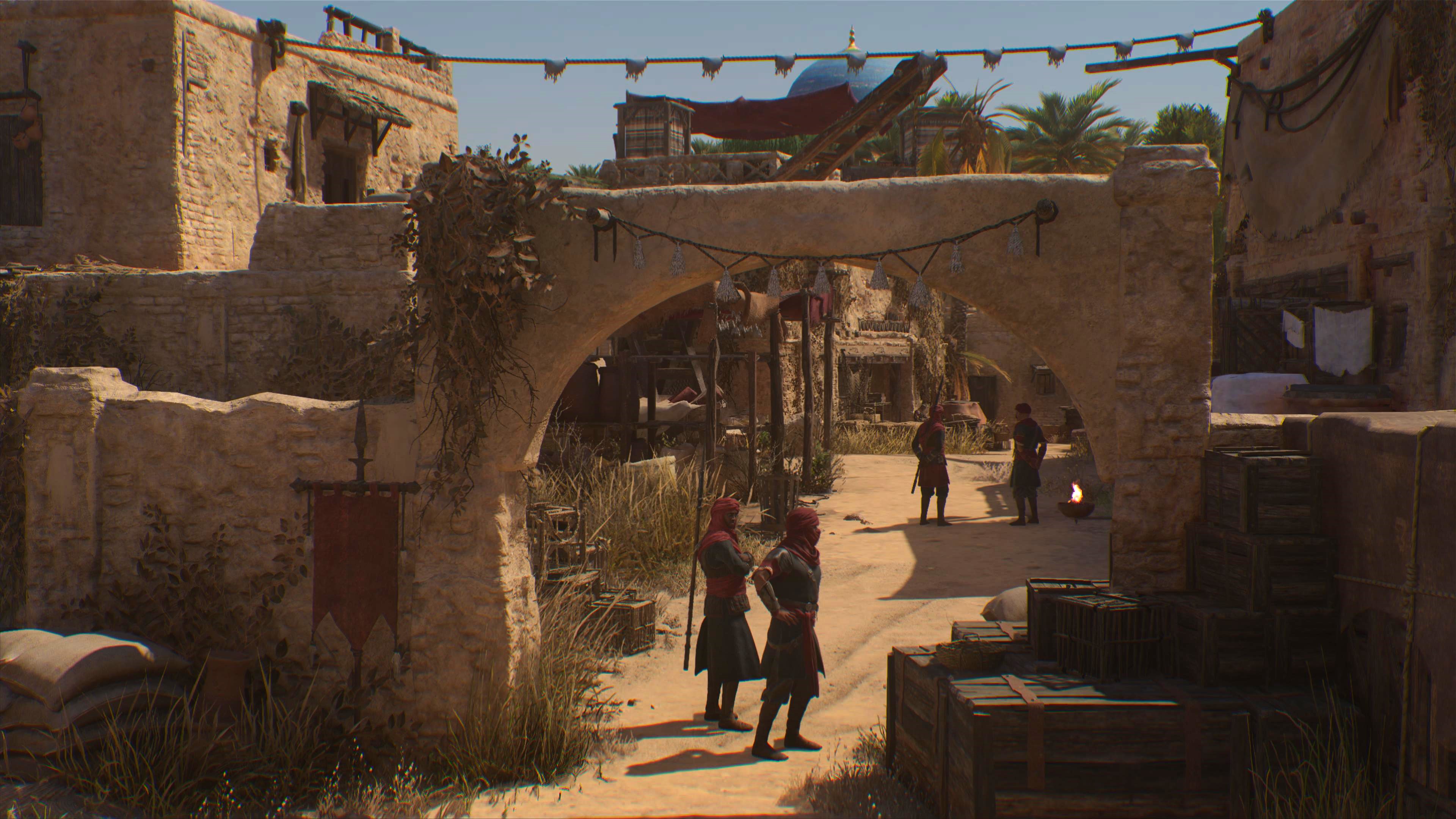Assassin’s Creed Mirage is the series’ first true stealth game
Blade in the crowd

Sign up for breaking news, reviews, opinion, top tech deals, and more.
You are now subscribed
Your newsletter sign-up was successful
Believe it or not, it was seven years before the Assassin’s Creed franchise added a proper crouch button. There were seven mainline entries into the stealth-action franchise before you could duck.
Since the release of Assassin’s Creed back in 2007, the series has always projected an illusion of stealth, without really embodying it at all in its core mechanics. Hidden Blades, Hidden Ones, and the idea that an Assassin can be an unseen phantom in the crowd with the proper training are all key ideas worn proudly by the long-running series. With Assassin's Creed Mirage, Ubisoft has finally produced a game that not only serves as a true stealth-focused affair, but one that allows you to actually feel like a competent, and formidable Assassin.
Assassin’s Creed Mirage is clearly built around stealth action in a way that its predecessors simply weren’t. Okay, Assassin’s Creed Unity certainly came close, but given the now infamously poor state of that game at launch, things simply never came together in the finished product.
Most Assassin’s Creed games, especially the last few games, give stealth as an option, but also hand players the tools to deal with huge crowds of enemies when things inevitably go south. This makes sense in a game like AC: Valhalla, as it is a Viking fantasy, after all, but older games embody the issue too. It was always possible to stand, parry, and insta-kill enemy after enemy, with no real consequence, from the original Assassin’s Creed through to Assassin’s Creed Origins. You can hide in bushes, and slowly take out enemy encampments if you want, but honestly, when you’re as suped-up as Kassandra or even Ezio, why would you?
Tonight we are notorious

Much of how Mirage encourages players to use stealth comes down to the new notoriety system. Perform kills or assassinations in front of witnesses, and your notoriety will grow. Eventually, it’ll get to the point where people will recognize you in the street, calling out to guards for help at the mere sight of you. Become wanted enough, and archers will pick you out from rooftops, and you’ll be hunted by dangerous mercenary enemies.
This notoriety system genuinely makes louder approaches feel weighted with consequences, offering enough downsides to push you towards stealth altogether. You’ll want to keep a very low profile in Assassin’s Creed Mirage, not only because it’s now a lot easier to do so, but because you’ll often be actively rewarded for it.
The gorgeously realized version of Baghdad that you’ll parkour your way through also helps to steer the player toward stealth. After the wide-open, but shallow and broad worlds of recent Assassin’s Creed games, Mirage’s world feels meticulous and deliberate in its design.
Sign up for breaking news, reviews, opinion, top tech deals, and more.
Every rooftop is packed with potential avenues forward, and for the first time in a while, you really do feel like you could parkour from one end of the city to the other, moving from point to point with clear intent and direction. Hiding places are littered absolutely everywhere as well, and there are zip lines that aid your escape, placed at just the right points on rooftops. It’s easier than ever to do what Assassin’s Creed has always asked its players to do: kill your target, flee from the guards, and then disappear into anonymity.
Throughout the marketing campaign for Assassin’s Creed Mirage, Ubisoft has consistently positioned the game as a throwback to the original Assassin’s Creed. And while there’s certainly a lot in Mirage that evokes Altair’s initial outing, plenty has been done to borrow from old and new entries equally. This is most felt in Mirage’s Tools system. There are a handful of Tools to unlock as you progress, many of which have featured in the series before. A throwing dagger might then be upgraded to dissolve bodies after a kill, or a smoke bomb can be tweaked to add a blinding powder that aids escapes. Like much of Mirage, the Tools here are streamlined, focused, and necessary, with very little fluff added in.
Throwing down the gauntlet

Around halfway through my time with Assassin’s Creed Mirage, I was tasked with infiltrating an extremely well-guarded library. After finding a way in, I made my way from bookcase to bookcase, with the final goal of reaching the end of a long corridor, which would hopefully lead me closer to a target.
As I made my way through a gauntlet of enemies, I used every single Tool I had available. Throwing daggers carefully aimed at those enemies I needed to dissolve and disappear, sleep darts used to drag groups of enemies to certain locations, and noisemakers thrown just under heavy chandeliers that could then be cut free and used to dispose of several enemies at once. By the end of this section, my inventory was completely empty, and one more enemy remained. By using the whistle to lure them closer, I was able to leap up and kill them. I had made use of each Tool, exactly in the way it had been intended. This is not how my Assassin’s Creed experiences usually go. Mirage is simply more refined, and in that refinement, the series receives its first competent stealth game.
By borrowing not only from classic Assassin’s Creed but from recent games like Valhalla and Odyssey, Assassin’s Creed Mirage is able to include a special ability. It’s the only one you’ll have access to for the entire game, and it’s essentially a super-powered chain assassination, that allows you to tag enemies and then warp between them, killing several in quick succession. This is all tied to Focus, a resource that is replenished by performing stealth kills. By upgrading it with Skill Points, you can unlock the ability to tag more targets and charge it more often. Hands down, this is the most useful special ability ever included in an Assassin’s Creed game, while also being one of its simplest. It’s there as a last resort if you suddenly need to clear a group of enemies, and can even be used as a traversal tool if you target out-of-reach adversaries.
Assassin’s Creed Mirage’s selection of systems is lean and refined, each absolutely essential to the whole. When combined, they allow the player to finally carry out assassinations with stealth-forward approaches, and then give them the space to disappear into the ether. The Assassin’s Creed series has been building to this seamless stealth-action experience for years now, even coming very close with Assassin’s Creed Unity. Surprisingly, it’s in Assassin’s Creed Mirage where all of this work has paid off, as decade-old design approaches gel with contemporary, ability-heavy action and modern quality-of-life features. Hopefully, this focus on stealth continues into the next game (Assassin’s Creed Red and Hexe are the next to come out), because after 16 years, it feels like the series has finally accomplished what it set out to do from the very beginning.
The best Assassin's Creed games will show you the very best of the series, but if you're looking for something different it might be worth checking out the best single-player games on PC.

Jake is currently working as Evergreen Editor at TechRadar Gaming. Hailing from the overcast shores of Brighton in the United Kingdom, Jake can be found covering everything from features to guides content around the latest game releases. As seen on NME.com, Eurogamer.net, and VG247.com, Jake specializes in breaking games down into approachable pieces for guides, and providing SEO advice to websites looking to expand their audiences.